Let’s move on to the books read in 2021. Of these there were plenty – too many to remember, let alone list. So, as in previous such lists, I am restricting myself to one book per month, even though some months were more full of riches than others, meaning some fine works had to be consigned to parentheses (Shiva Naipaul’s The Chip-Chip Gatherers, the stories of Ivan Bunin, Iris Origo’s classic historical study The Merchant of Prato, the novellas of Yuri Herrara). As it is, there are fourteen books, for reasons that will be made clear. Anyway, some fine reading is described below, with the hope that others may be encouraged to investigate (or to ask why it took me so long to get round to something they discovered and treasured years ago).
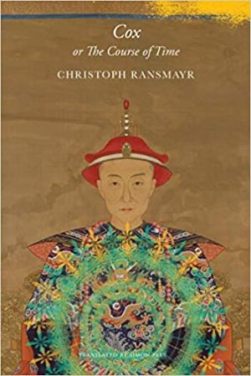 January. I am gradually making my way through the works of Austrian writer Christoph Ransmayr (or at least those available in English). In part this is a helpless quest – a very Ransmayr-ish theme – in the hope of finding anything to match his masterpiece, the travel book Atlas of an Anxious Man. I bought his 2020 novel Cox or The Course of Time for my birthday in May of that year. It took eight months to arrive. No matter – it was worth it, a small jewel of a book, exquisitely presented by tasteful publishers Seagull Books. It tells of an eighteenth-century English clockmaker who is ordered to China to build a fantastical series of time-measuring devices for the Qianlong Emperor. As is usual with Ransmayr, the book blends the historical with the fantastical, much as Cox the clockmaker is based on a historical person but one who never went to China. Set among a time of absurd cruelties and demands, such as absolute power must create, it ends with Cox building a clock capable of measuring eternity. What it all means is not entirely clear, as its speculations on the nature of time are not especially profound. But it is like some vivid dream, no detail of which you want to forget.
January. I am gradually making my way through the works of Austrian writer Christoph Ransmayr (or at least those available in English). In part this is a helpless quest – a very Ransmayr-ish theme – in the hope of finding anything to match his masterpiece, the travel book Atlas of an Anxious Man. I bought his 2020 novel Cox or The Course of Time for my birthday in May of that year. It took eight months to arrive. No matter – it was worth it, a small jewel of a book, exquisitely presented by tasteful publishers Seagull Books. It tells of an eighteenth-century English clockmaker who is ordered to China to build a fantastical series of time-measuring devices for the Qianlong Emperor. As is usual with Ransmayr, the book blends the historical with the fantastical, much as Cox the clockmaker is based on a historical person but one who never went to China. Set among a time of absurd cruelties and demands, such as absolute power must create, it ends with Cox building a clock capable of measuring eternity. What it all means is not entirely clear, as its speculations on the nature of time are not especially profound. But it is like some vivid dream, no detail of which you want to forget.
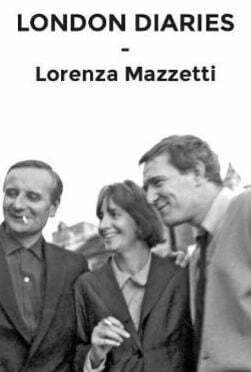 February. Lorenza Mazzetti was an Italian filmmaker who made the neglected film Together (1956) as part of the renowned Free Cinema movement. She made other films, wrote books and became a painter. London Diaries (2018, first published in Italian in 2014) tell of her time in London in the mid-50s with Lindsay Anderson, Karel Reisz, Tony Richardson and others of the Free Cinema crowd. As with all her works, it is haunted by an horrific event when most of her family were executed at their farm by Nazis, because their name was Einstein (Albert was a relative). Saved by her surname, she tried to escape from the memory by relocating to London. Penniless, but determined and persuasive, she begs her way into the Slade School of Fine Art, and ends up an experimental filmmaker. Film was not really her metier, but her short memoir is a film in words – raw, observant, lyrical, life caught on the fly, the very spirit that Free Cinema espoused (if only occasionally delivered).
February. Lorenza Mazzetti was an Italian filmmaker who made the neglected film Together (1956) as part of the renowned Free Cinema movement. She made other films, wrote books and became a painter. London Diaries (2018, first published in Italian in 2014) tell of her time in London in the mid-50s with Lindsay Anderson, Karel Reisz, Tony Richardson and others of the Free Cinema crowd. As with all her works, it is haunted by an horrific event when most of her family were executed at their farm by Nazis, because their name was Einstein (Albert was a relative). Saved by her surname, she tried to escape from the memory by relocating to London. Penniless, but determined and persuasive, she begs her way into the Slade School of Fine Art, and ends up an experimental filmmaker. Film was not really her metier, but her short memoir is a film in words – raw, observant, lyrical, life caught on the fly, the very spirit that Free Cinema espoused (if only occasionally delivered).
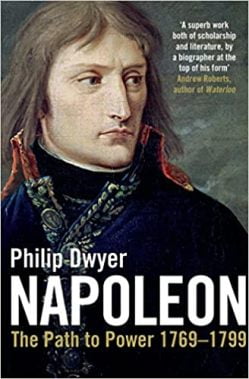 March. The sometime Emperor Napoleon died on St Helena on 5 May 2021. It being the two hundredth anniversary of his death, I decided it was high time I read a biography of the man. I picked the three-volume set by Philip Dwyer, reasoning that with a bit of effort, if I started in late February I might just get through all 1,841 pages by some time in May. In fact I got through almost all of it in March. The books are tremendously readable. They give you a deep sense of both the legend and the man, the strategic brilliance and the folly, the design and the accident that shaped his life. Dwyer goes to great pains to show how some notable Napoleonic triumphs were neither notable nor attributable to any sort of genius, but on balance this makes his fall logical rather than anything so absurd as tragic. The first Napoleon: The Path to Power spends a long time establishing his unlikely rise (we learn a great deal of internecine Corsican politics). The second, Citizen Emperor, the longest, crams in all the battles without glorifying any of them. The third, Napoleon: Passion, Death and Resurrection is a bit of an oddity, lingering over St Helena then following the changes in his posthumous reputation. The trilogy feels like four books awkwardly shaped into three, but that doesn’t stop it being so compelling through out. It works so well because you see the triumph but also the ridiculousness, with no divide between the two.
March. The sometime Emperor Napoleon died on St Helena on 5 May 2021. It being the two hundredth anniversary of his death, I decided it was high time I read a biography of the man. I picked the three-volume set by Philip Dwyer, reasoning that with a bit of effort, if I started in late February I might just get through all 1,841 pages by some time in May. In fact I got through almost all of it in March. The books are tremendously readable. They give you a deep sense of both the legend and the man, the strategic brilliance and the folly, the design and the accident that shaped his life. Dwyer goes to great pains to show how some notable Napoleonic triumphs were neither notable nor attributable to any sort of genius, but on balance this makes his fall logical rather than anything so absurd as tragic. The first Napoleon: The Path to Power spends a long time establishing his unlikely rise (we learn a great deal of internecine Corsican politics). The second, Citizen Emperor, the longest, crams in all the battles without glorifying any of them. The third, Napoleon: Passion, Death and Resurrection is a bit of an oddity, lingering over St Helena then following the changes in his posthumous reputation. The trilogy feels like four books awkwardly shaped into three, but that doesn’t stop it being so compelling through out. It works so well because you see the triumph but also the ridiculousness, with no divide between the two.
 April. From the emperor to one of his generals. There was a TV version of The Three Musketeers a few years back, in which Porthos was played by a black actor. That might have seemed to some to be an anachronistic attempt at more diverse casting than most literary classics traditionally allow, but in this case it was witty and apposite. Porthos (one of the musketeers) was based in character on the author Alexandre Dumas’s eponymous father, the son of a disgraced white noblemen and a black slave. The author’s father rose through his own genius to become a general in Napoleon’s armies, idolised by a son who scarcely knew his father, since the latter died when the boy was only four. The biographer Tom Reiss, author of The Black Count, is too scrupulous to over-romanticise a life that ended, after early triumphs, in sickness and failure when General Dumas fell out of favour with Napoleon. You wish for the sort of ending the son would have given to such a story, but only because the details has been so rich (especially his early life on Saint-Dominigue) and because you thrill throughout at a genuinely noble character.
April. From the emperor to one of his generals. There was a TV version of The Three Musketeers a few years back, in which Porthos was played by a black actor. That might have seemed to some to be an anachronistic attempt at more diverse casting than most literary classics traditionally allow, but in this case it was witty and apposite. Porthos (one of the musketeers) was based in character on the author Alexandre Dumas’s eponymous father, the son of a disgraced white noblemen and a black slave. The author’s father rose through his own genius to become a general in Napoleon’s armies, idolised by a son who scarcely knew his father, since the latter died when the boy was only four. The biographer Tom Reiss, author of The Black Count, is too scrupulous to over-romanticise a life that ended, after early triumphs, in sickness and failure when General Dumas fell out of favour with Napoleon. You wish for the sort of ending the son would have given to such a story, but only because the details has been so rich (especially his early life on Saint-Dominigue) and because you thrill throughout at a genuinely noble character.
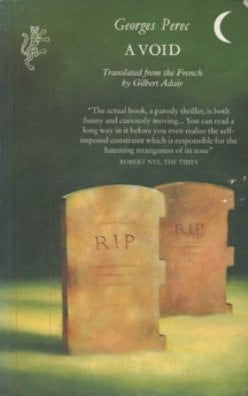 May. Some classics you put off because of the fear of disappointment. I had long wanted to read Georges Perec’s famous La disparition, the novel written without the letter e, translated with equal fame by Gilbert Adair as A Void. I feared something ingenious but arid. How wrong I was. A Void is so much more than an exercise in technical ingenuity. It is funny, serious and eventually wise; a metaphysical puzzle with a dark centre; a novel that turns on itself. As for the translation – it leaves you wondering how on earth is could have been achieved in French, for here is its language. Adair relishes his task, not simply achieving the linguistic French-to-English equivalent but playing games with the reader as he tests the limits of Perec’s conception, with rococo lists of adjectives when a shorter, no less e-less construction could have served the same purpose. The translation becomes an essential part of the conception. Maybe Perec always knew this.
May. Some classics you put off because of the fear of disappointment. I had long wanted to read Georges Perec’s famous La disparition, the novel written without the letter e, translated with equal fame by Gilbert Adair as A Void. I feared something ingenious but arid. How wrong I was. A Void is so much more than an exercise in technical ingenuity. It is funny, serious and eventually wise; a metaphysical puzzle with a dark centre; a novel that turns on itself. As for the translation – it leaves you wondering how on earth is could have been achieved in French, for here is its language. Adair relishes his task, not simply achieving the linguistic French-to-English equivalent but playing games with the reader as he tests the limits of Perec’s conception, with rococo lists of adjectives when a shorter, no less e-less construction could have served the same purpose. The translation becomes an essential part of the conception. Maybe Perec always knew this.
 June. Songs that tell stories can have such powerful stories behind them. There’s the story that inspired them, the story of how their audience found them, the story of how they have lasted, adapting to changing times, deepening their richness. ‘Stagolee’ (or ‘Stackolee’ or ‘Stagger Lee’ or ‘Stack a Lee’ or several other variants) was first composed by who knows who in 1895, when ‘Stag’ Lee Shelton shot Billy Lyons in a St Louis bar in 1895, ostensibly because of a disagreement over a hat. Many songs were composed off-the-cuff in the clubs of the American south, serving as a combination of news service and celebration of lives lived on the edge. Many were soon forgotten, but ‘Stagolee’ survived, going on to be sung by Ma Rainey, Wilson Pickett, Bob Dylan, Nick Cave and the Bad Seeds, the Isley Brothers, Ike and Tina Turner, Lonnie Donegan, James Brown, Dr John, Neil Diamond, The Clash and many more. Stagolee is the archetypal bad man, the black anti-hero, whose attitude lived on through the Black Panthers (co-founder Bobby Seale named his son Stagolee), Superfly and rap. Stagolee Shot Billy, Cecil Brown’s superb combination of musicology and and social history shows how one song can frame the times.
June. Songs that tell stories can have such powerful stories behind them. There’s the story that inspired them, the story of how their audience found them, the story of how they have lasted, adapting to changing times, deepening their richness. ‘Stagolee’ (or ‘Stackolee’ or ‘Stagger Lee’ or ‘Stack a Lee’ or several other variants) was first composed by who knows who in 1895, when ‘Stag’ Lee Shelton shot Billy Lyons in a St Louis bar in 1895, ostensibly because of a disagreement over a hat. Many songs were composed off-the-cuff in the clubs of the American south, serving as a combination of news service and celebration of lives lived on the edge. Many were soon forgotten, but ‘Stagolee’ survived, going on to be sung by Ma Rainey, Wilson Pickett, Bob Dylan, Nick Cave and the Bad Seeds, the Isley Brothers, Ike and Tina Turner, Lonnie Donegan, James Brown, Dr John, Neil Diamond, The Clash and many more. Stagolee is the archetypal bad man, the black anti-hero, whose attitude lived on through the Black Panthers (co-founder Bobby Seale named his son Stagolee), Superfly and rap. Stagolee Shot Billy, Cecil Brown’s superb combination of musicology and and social history shows how one song can frame the times.
Of all the many versions of the song, I think Mississippi John Hurt’s is the finest.
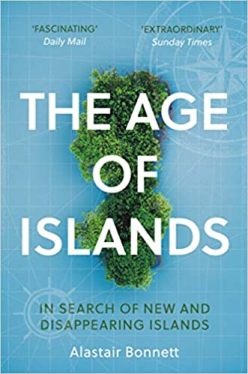 July. Alastair Bonnett is a social geographer and a fine writer. He shows us that a world that might seem wholly discovered, wholly understood, is in fact changing before our eyes. Of course we know about the forces that are causing climate change, but in The Age of Islands Bonnett focusses on a specific phenomenon: the emergence and disappearance of islands. The emerging islands are mostly human creations, deliberate or accidental – Flevopolder in The Netherlands, The World in Dubai, the Accidental islands of Pebble Lake, Hungary and the several trash islands now floating about our oceans. Nature makes islands too – Hunga Tonga-Hunga Ha’apai established itself in 2014 after a submarine volcanic eruption. Disappearing islands include the San Blas Islands of Gun Yala, Panama and the Isles of Scilly, each facing oblivion, or at least viability, courtesy of global warning. But it is the artificial islands, deliberate and accidental, that make the reader think the world is no longer what it was. We are rebuilding it because we cannot help ourselves.
July. Alastair Bonnett is a social geographer and a fine writer. He shows us that a world that might seem wholly discovered, wholly understood, is in fact changing before our eyes. Of course we know about the forces that are causing climate change, but in The Age of Islands Bonnett focusses on a specific phenomenon: the emergence and disappearance of islands. The emerging islands are mostly human creations, deliberate or accidental – Flevopolder in The Netherlands, The World in Dubai, the Accidental islands of Pebble Lake, Hungary and the several trash islands now floating about our oceans. Nature makes islands too – Hunga Tonga-Hunga Ha’apai established itself in 2014 after a submarine volcanic eruption. Disappearing islands include the San Blas Islands of Gun Yala, Panama and the Isles of Scilly, each facing oblivion, or at least viability, courtesy of global warning. But it is the artificial islands, deliberate and accidental, that make the reader think the world is no longer what it was. We are rebuilding it because we cannot help ourselves.
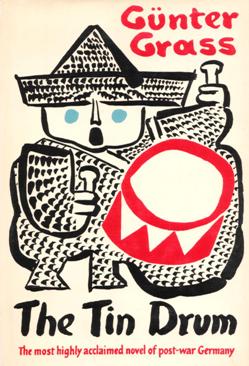 August. I saw the film of Gunter Grass’s The Tin Drum a couple of years after it came out, probably at some film society, in the early 1980s. It was startling, a little shocking, filled with vivid images and graced by an astonishing performance by David Bennent as the boy with his drum and glass-shattering shriek, who refuses to grow up as he witnesses Germany descend into Nazism. Forty years later I picked up the book, because it was a handsome copy and there would have to be something in it, given its reputation. Within three pages I knew that here was one of the finest books I’d read – and how abject the film had been at trying to recreate it. A more prodigious, exalted yet earthy book would be hard to imagine. It just does everything on a grander imaginative scale. It has errors, but they are huge errors, of the kind only a great book could attempt and survive. So it is a good deal too pleased with itself at times. It goes on too long. Maybe its central metaphor is never clearly explained. And yet, and yet – here is all that words can do. My book of the year.
August. I saw the film of Gunter Grass’s The Tin Drum a couple of years after it came out, probably at some film society, in the early 1980s. It was startling, a little shocking, filled with vivid images and graced by an astonishing performance by David Bennent as the boy with his drum and glass-shattering shriek, who refuses to grow up as he witnesses Germany descend into Nazism. Forty years later I picked up the book, because it was a handsome copy and there would have to be something in it, given its reputation. Within three pages I knew that here was one of the finest books I’d read – and how abject the film had been at trying to recreate it. A more prodigious, exalted yet earthy book would be hard to imagine. It just does everything on a grander imaginative scale. It has errors, but they are huge errors, of the kind only a great book could attempt and survive. So it is a good deal too pleased with itself at times. It goes on too long. Maybe its central metaphor is never clearly explained. And yet, and yet – here is all that words can do. My book of the year.
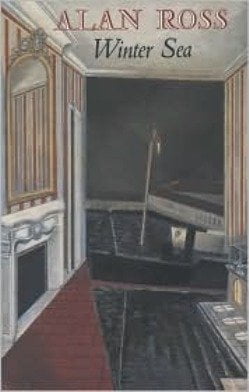 September. Alan Ross was a poet, cricket correspondent, memoirist, editor (The London Magazine) and travel writer. He probably did too many things proficiently rather than a few things well, but in September I became hooked on his writing after stumbling across Winter Sea, intrigued by its Tallinn setting and its mixture of memoir, travel and poetry. In his travel and memoirs books Ross developed a distinctive style of book, breaking up the prose chapters with pages of his poems (which have a strong historical-memoir flavour to them). The mixture works particularly well in Winter Sea, which explores his memories of serving on supply ships to the Soviet Union during World War Two and a German naval officer whom he befriends after war. The officer eventually moved to Estonia, and after his death Ross embarks on a discovery of the man, the place, and his own memories. It is a singularly effective concoction. A minor work, but one in which all of the elements have fallen ideally into place.
September. Alan Ross was a poet, cricket correspondent, memoirist, editor (The London Magazine) and travel writer. He probably did too many things proficiently rather than a few things well, but in September I became hooked on his writing after stumbling across Winter Sea, intrigued by its Tallinn setting and its mixture of memoir, travel and poetry. In his travel and memoirs books Ross developed a distinctive style of book, breaking up the prose chapters with pages of his poems (which have a strong historical-memoir flavour to them). The mixture works particularly well in Winter Sea, which explores his memories of serving on supply ships to the Soviet Union during World War Two and a German naval officer whom he befriends after war. The officer eventually moved to Estonia, and after his death Ross embarks on a discovery of the man, the place, and his own memories. It is a singularly effective concoction. A minor work, but one in which all of the elements have fallen ideally into place.
 October. I bought Peter’s Scupham’s Summer Palaces in 1980, or thereabouts. I must have picked up on his work from some magazine or anthology. I guess I must have read some of it for a while, but then it went on the shelves, and moved house with me – seven times, if I’ve counted rightly – filed among the Ss, until my eye drifted past that shelf, and I looked again. Perhaps it needed forty years to get a sense of things. Peter Scupham is a poet of high sensibility. His subject matter is seemingly narrow: the countryside, wartime memories, amateur theatricals, the retiring life of an academic. But the poetry is in the observation, not in the thing observed. It is singularly acute poetry, in which each thing apprehended has a visible life and a hidden one revealed by language, place and circumstance. Things lost and what remains of them in the senses is a recurrent theme, as in the conclusion to ‘Twelfth Night’:
October. I bought Peter’s Scupham’s Summer Palaces in 1980, or thereabouts. I must have picked up on his work from some magazine or anthology. I guess I must have read some of it for a while, but then it went on the shelves, and moved house with me – seven times, if I’ve counted rightly – filed among the Ss, until my eye drifted past that shelf, and I looked again. Perhaps it needed forty years to get a sense of things. Peter Scupham is a poet of high sensibility. His subject matter is seemingly narrow: the countryside, wartime memories, amateur theatricals, the retiring life of an academic. But the poetry is in the observation, not in the thing observed. It is singularly acute poetry, in which each thing apprehended has a visible life and a hidden one revealed by language, place and circumstance. Things lost and what remains of them in the senses is a recurrent theme, as in the conclusion to ‘Twelfth Night’:
Our candles, lit, re-lit, have gone down now:
Only the tears, the veils, the hanging tree
Whose burning gauze thins out across the sky,
Whose brightness dies to image. And the snow.
I am now working my way through his works – slowly, because only slowly will do. They bring insight to everything.
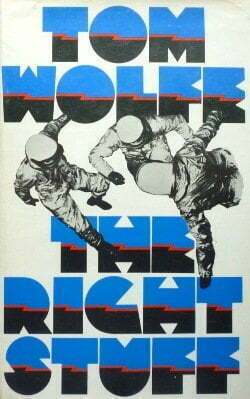 November. Another classic whose time came by browsing along the right shelf at the right time. Tom Wolfe’s The Right Stuff is, again, a book that I first experienced as a film, back in 1983, when Philip Kaufman’s film of the Mercury space programme pilots seemed indeed that it was composed of the right stuff. And again, having read the book, I can no longer think so. The book is brilliantly researched and dazzlingly written (though with a few too many exclamation marks for my sensitive eyes). It startles simply because of its subject matter in this particular journalist’s hands, turning what otherwise have been gung-ho or dryly technical into an indelible summary of a particular age in American life. It is satirical but also profoundly sympathetic towards its subjects – it is no surprise to learn that the astronauts and their families for the most part have praised the book but damned the film, chiefly for its comic tone. As with film of The Tin Drum, the film of The Right Stuff mistakes incident for substance. It’s ironic that the quality of physical and mental capabilities encapsulated in the title phrase, which Wolfe identifies as an American ideal and which lies at the heart of so much of American cinema, is absent from the film that wants to champion it. The book understands; the film does not.
November. Another classic whose time came by browsing along the right shelf at the right time. Tom Wolfe’s The Right Stuff is, again, a book that I first experienced as a film, back in 1983, when Philip Kaufman’s film of the Mercury space programme pilots seemed indeed that it was composed of the right stuff. And again, having read the book, I can no longer think so. The book is brilliantly researched and dazzlingly written (though with a few too many exclamation marks for my sensitive eyes). It startles simply because of its subject matter in this particular journalist’s hands, turning what otherwise have been gung-ho or dryly technical into an indelible summary of a particular age in American life. It is satirical but also profoundly sympathetic towards its subjects – it is no surprise to learn that the astronauts and their families for the most part have praised the book but damned the film, chiefly for its comic tone. As with film of The Tin Drum, the film of The Right Stuff mistakes incident for substance. It’s ironic that the quality of physical and mental capabilities encapsulated in the title phrase, which Wolfe identifies as an American ideal and which lies at the heart of so much of American cinema, is absent from the film that wants to champion it. The book understands; the film does not.
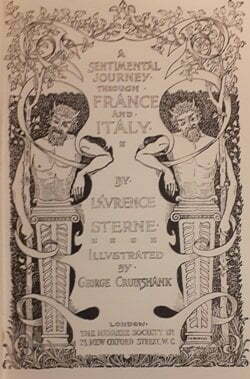 December. Am I revisiting all that I encountered when I first starting reading, and watching, things with a critical eye, establishing my ideas of how art works, and with it a personal canon? I was eighteen when I first read Laurence Sterne’s Tristram Shandy and, to this day, if anyone were to ask me what my favourite novel was, I would say that it was Tristram Shandy, even though I have not read it again in many years. It established the idea of what excellence was, through its playing against expectations, against time itself, wrestling with the limitations of language while in love with all that it can do. It laughed wisely. I’ll return to it next year, and to get myself in training I picked up another favourite, A Sentimental Journey Through France and Italy, its sequel or adjunct (Sterne’s intentions aren’t entirely clear), in which the author’s alter ego Yorick journeys through France (he never gets to Italy). Yorick makes little note of place but everything of people, the niceties of circumstance and the sensibilities of gentle human relations. It is inconsistent, almost free-form, yet every line is an exhilarating demonstration of what words can be made to do. Language, and the mind best attuned to language, is Sterne’s true journey.
December. Am I revisiting all that I encountered when I first starting reading, and watching, things with a critical eye, establishing my ideas of how art works, and with it a personal canon? I was eighteen when I first read Laurence Sterne’s Tristram Shandy and, to this day, if anyone were to ask me what my favourite novel was, I would say that it was Tristram Shandy, even though I have not read it again in many years. It established the idea of what excellence was, through its playing against expectations, against time itself, wrestling with the limitations of language while in love with all that it can do. It laughed wisely. I’ll return to it next year, and to get myself in training I picked up another favourite, A Sentimental Journey Through France and Italy, its sequel or adjunct (Sterne’s intentions aren’t entirely clear), in which the author’s alter ego Yorick journeys through France (he never gets to Italy). Yorick makes little note of place but everything of people, the niceties of circumstance and the sensibilities of gentle human relations. It is inconsistent, almost free-form, yet every line is an exhilarating demonstration of what words can be made to do. Language, and the mind best attuned to language, is Sterne’s true journey.